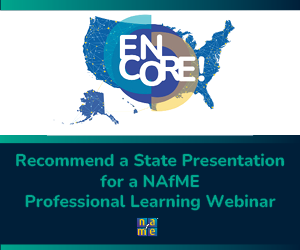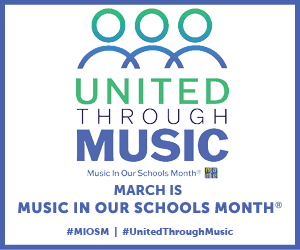NAfME BLOG
Guitar Program Advocacy: Interview with Three New Jersey Guitar Program Directors
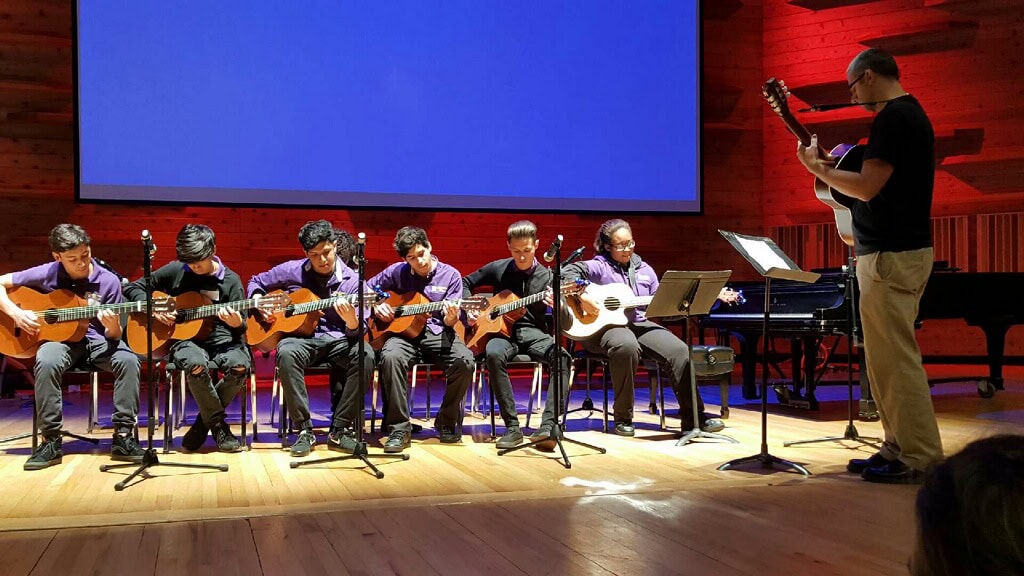
/ News Posts / Guitar Program Advocacy: Interview with Three New Jersey Guitar Program Directors
Guitar Program Advocacy
Interview with Three New Jersey Guitar Program Directors
By Thomas J. Amoriello Jr.
NAfME Member and NAfME Council for Guitar Education Chair-Elect
During the last few years, the presence of the guitar in schools has become more prominent across the country and the state of New Jersey is a great example of this progress. The New Jersey Music Educators Association has added a guitar representative as an appointed member to its board of directors, initiated a NJMEA Honors Guitar Ensemble, features guitar advocacy articles in its state journal, and hosts an annual guitar festival every May. Today we visit with three high school guitar program directors to hear what works for them in the Garden State.
Thank you to Vin Downes of Bayonne High School, Steven Sabet of Elizabeth High School, and Andrew Jaworski of Edison High School for sharing their ideas.
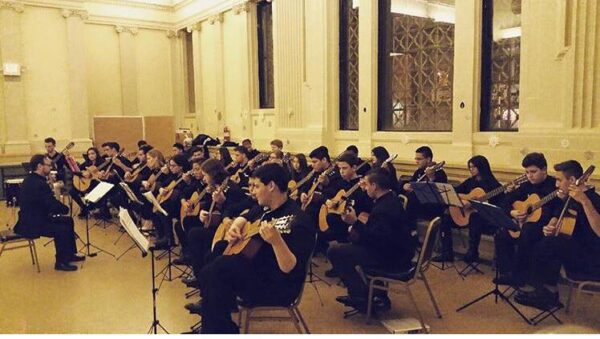
Courtesy of Vin Downes
Please tell us about your school and overall music program.
Vin Downes: I started the classical guitar program at Bayonne High School in 2012. It began with just a Guitar 1 class offering beginning classical guitar technique. Since then, the program has grown to offer Guitar 1, 2, and 3 level classes, as well as numerous performing ensembles including: Guitar 2 Ensemble, Guitar 3 Ensemble, Combined Ensemble, Chamber Guitar Ensemble, and Honors Guitar Quartet. I have had over 100 students enrolled in the program every year. It is one of the most popular electives in my school.
Steven Sabet: Thomas Jefferson Arts Academy is an open-admissions public high school in Elizabeth, NJ. We offer strands in Performing, Visual, and Media Arts. Our music program offers Guitar, Choir, Piano, Band, Musical Theater, Music Theory, and Music Technology classes.
Andrew Jaworski: Edison High School has a total enrollment of just about 2,000 students, and a robust performing arts program, which features a wide array of Band, Choir, Orchestral, and plucked string ensembles, classes in Music Theory, Music Technology, and our newly founded Dance program. The Guitar Department is made up of about 45 students in three leveled guitar courses. I also direct the EHS Guitar Ensemble, which is in its second year. The ensemble rehearses weekly after school, and we have a few performances throughout the year.
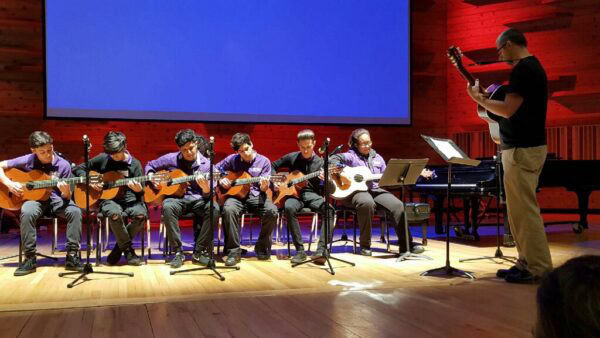
Courtesy of Steven Sabat
What would you like to say to the non-guitarist music educator who is about to or is interested in incorporating the guitar into their program?
Vin: Even if you are a non-guitarist, a few chords can go a long way. Pick up a guitar and learn some open position chords and start a guitar club at your school. Guitar is incredibly popular at the middle school and high school level because you can find it in just about every genre of music. It is a fantastic gateway for students who may not fit into the other performance components of a music program to get involved. That’s how I first got involved in my high school music program . . . the jazz band needed a guitar player. It’s an effective tool to increase your program’s reach to students who might not ordinarily sign up.
Andrew: Try it! Teaching guitar is a great way to “hook” students. Being one of the most ubiquitous instruments out there, the guitar has found its way into almost every genre. You’ll be giving those students who didn’t gravitate towards traditional band and orchestral instruments another option . . . a different path to explore music. I know it can sound daunting for a non-guitarist, but the benefits are worth it. If you’re worried about your own abilities, reach out to a guitar teacher or maybe take a few lessons over the summer.
“Even if you are a non-guitarist, a few chords can go a long way. Pick up a guitar and learn some open position chords and start a guitar club at your school.”
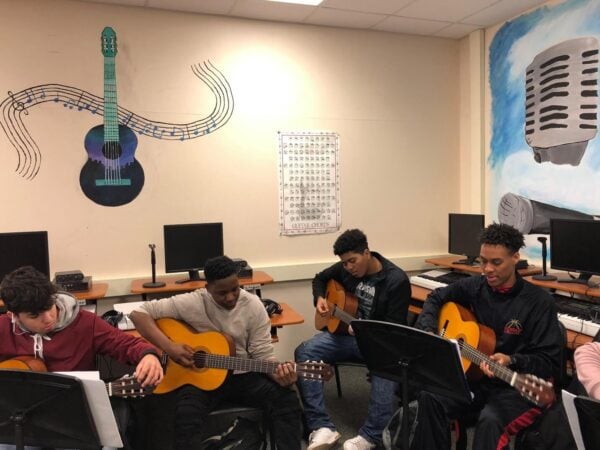
Courtesy of Andrew Jaworski
Do you have any success stories you would like to share about students (musical & non-musical)?
Vin: I had a freshman take my Guitar 1 class a few years ago. He was overly quiet, introverted, and was having a hard time fitting in socially. He turned out to be a very good player, so the following year, I had him skip Guitar 2 and go right into Guitar 3. That next year, he was making friends with all the other guitarists and was an outspoken class leader. He was a completely different kid! He is now a senior preparing for his college auditions. He plans on majoring in classical guitar and music education.
He recently told me that when he first started high school, he was suffering from severe depression and anxiety. Guitar class was the only thing that kept him positive about coming to school. He insists that it changed his life and help shape the person he is today. Sometimes we get so caught up in lessons, concerts, fundraisers, paperwork, etc., that it can be easy to forget the power music has to change lives.
Steven: We’ve managed to build a successful program over the years. We perform regularly at school concerts and help with the fall play and spring musical. We perform yearly at the Union County Teen Arts Festival and are regularly invited to the Union County Teen Arts Showcase and NJ State Teen Arts Festivals. Some of my guitar students have been members of the NJMEA Honors Guitar Ensemble. My students entered the NJMEA Music Technology Expo and received top awards and also performed at the Expo at Rutgers University. We entered the Little Kids Rock Songwriting Competition and won at least one category in the last three years.
Additionally, my program has developed successful outreach events with notable artists like Jorge Cabellero, Joao Luiz, Ana Maria Rosado, Francisco Roldan, and the Newman & Altman Duo. I think it is very important for high schools to invite outside artists to interact, perform, and coach students, because it fosters ongoing learning and growth from an outside perspective.
“Sometimes we get so caught up in lessons, concerts, fundraisers, paperwork, etc., that it can be easy to forget the power music has to change lives.”
What do you tell your talented students who are planning to pursue music or guitar studies in high school or college after they finish with you?
Steven: Many of my students study music at college, and I’ve helped them prepare for their auditions or music technology/composition portfolios. It is important for students to check and adhere to each school’s admission requirements. It is critical for students to meet the school’s professors, tour the school’s facilities, and try to sit in on lessons and classes. One reason why I set up outreach events with local colleges is to provide an opportunity for my students to interact with college professors and sample what they have to offer.
High school students should also talk to students and watch them perform at the college to see if the school is right for them. Taking the extra initiative to ask questions, visit, and see what the college really has to offer students is critical because it can reinforce the correct choice.
Andrew: Usually a lot of philosophy . . . I try to draw from my professional experiences before I started teaching. These are a few things I try to get them to think about:
- Versatility is key. Don’t be a “one-trick-pony.” Explore all styles that interest you, and get good at as many of them as you can. You’ll be that chameleon of a musician, someone who can jump into any situation and contribute, whether that’s a classical guitar quartet rehearsal, a last-minute jazz gig, a musical pit rehearsal, or whatever the situation is. For working musicians in today’s industry, that’s an extremely valuable skill.
- Collaborate. Play with other musicians, and not just other guitarists. Open your ears when you do. You can learn so much by listening to and playing with other musicians. Maybe that tasty blues lick your friend just played on trumpet will find its way into your guitar solo next time . . .
- Be prepared. Preparation can help you avoid so many problems before they grow into big problems. Whether it’s learning your music for an upcoming lesson, prepping for a recital, or working on a collaborative project, aim to be the most prepared person in the room. And personally, as an extremely nervous performer, I’ve found that the confidence I gain from being well prepared is often exactly what I need to overcome my own performance anxiety.
- Work hard. At whatever task is before you, music or otherwise. Be satisfied with nothing less than your best. Quest for greatness, and once you think you’ve “made it,” get back to work. Grow and don’t stop growing.
Whether it’s learning your music for an upcoming lesson, prepping for a recital, or working on a collaborative project, aim to be the most prepared person in the room.
Any last thoughts to conclude our interview?
Steven: Many people in our society question the value of music as a worthy educational endeavor. Honestly, all subjects can be questioned of their worth, if we just look at them at the surface level. However, every subject is important because we never know when we will be in a position to apply knowledge learned from another discipline.
About the author:
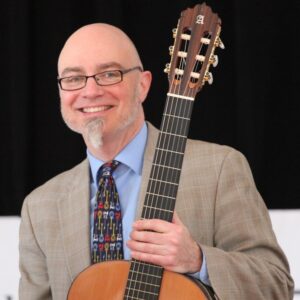
Valentina Jotovic
Thomas Amoriello is the Guitar Education Chairperson for the New Jersey Music Education Association and also serves on the NAfME Council for Guitar Education as the Chair-Elect. He teaches guitar for the Flemington Raritan School District and Hunterdon Academy of the Arts. Tom graduated from Shenandoah Conservatory with a Master of Music Degree in Classical Guitar Performance. He is the author of the children’s picture books: A Journey to Guitarland with Maestro Armadillo & Ukulele Sam Strums in the Sand, both available from Black Rose Writing. He recently made a heavy metal recording with a stellar roster of musicians including former members of Black Sabbath, Whitesnake, Ozzy Osbourne, Yngwie J. Malmsteen’s Rising Force, and Cacophony, which will be released in February 2018 on H42 Records of Hamburg, Germany on 7-inch Vinyl.
Published Date
February 26, 2018
Category
- Ensembles
Copyright
February 26, 2018. © National Association for Music Education (NAfME.org)

